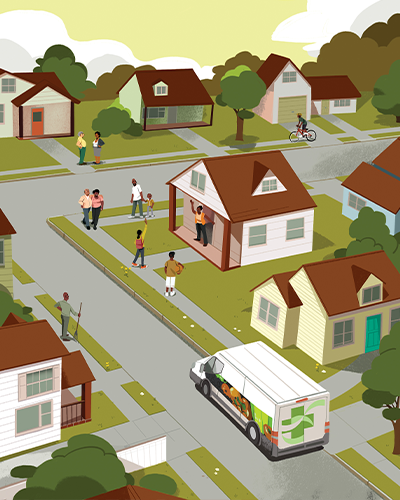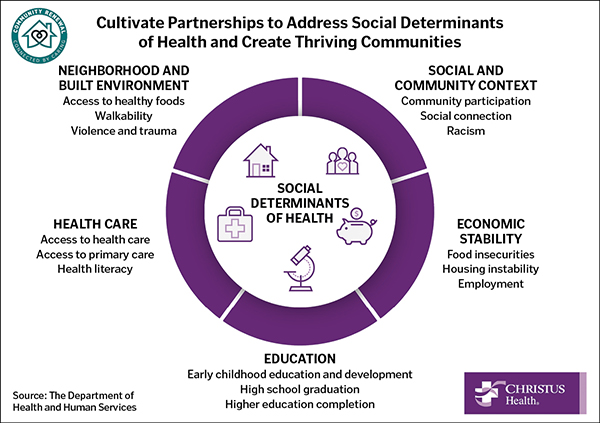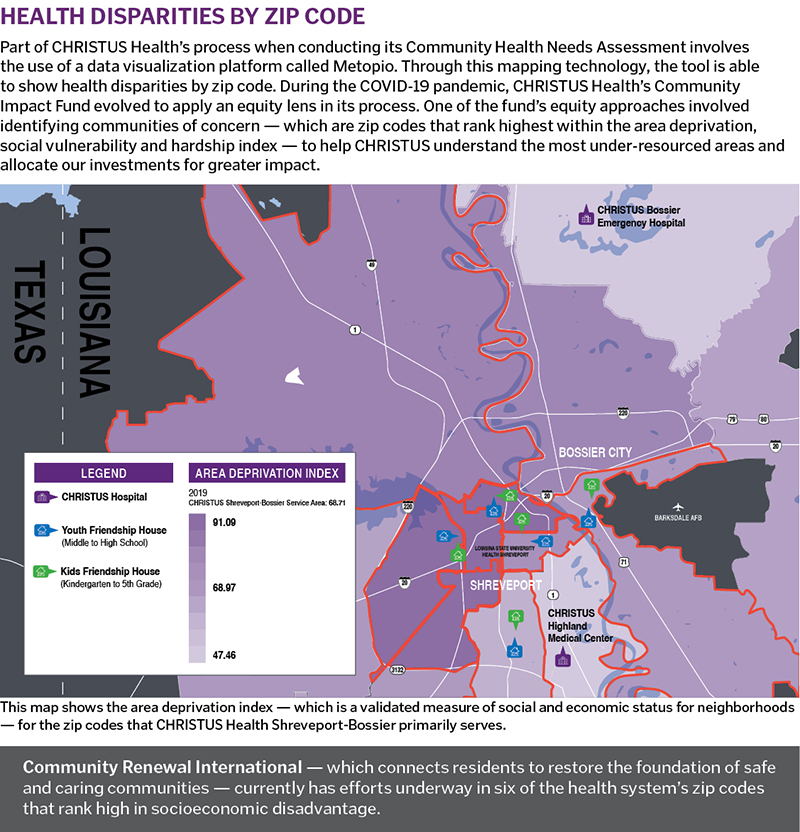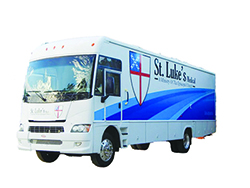NADINE NADAL, MPH, CPH, CHES
Director, Community Health Development, CHRISTUS Health

In the Highland neighborhood of Shreveport, Louisiana, 22-year-old Robert Renter leans against a table inside a home called a Friendship House. Part residence and part community center, the Friendship House has come to mean a lot to Renter, who nervously finds his words to explain to visitors something so sentimental to him: "I am a young Black man in America, and five or six years ago, I wasn't exactly a model student."
Today, Renter — who works in Shreveport for a telecommunications company — says, "Life is good." He smiles as he talks about his girlfriend and a younger brother he says he might spoil too much. Of his mentor at the Friendship House, Diedra Robertson, he says, "Ms. Diedra helped me get here by giving me an afterschool outlet where I could be with my good friends. Matter of fact, I'm best friends to this day with my friend from here."
Robertson lives in a Friendship House with her husband, and she is a supervisor to a growing number of Friendship Houses in the Shreveport-Bossier City area. The eleventh Friendship House is scheduled to open soon. Robertson explains that the goal of the Friendship Houses effort — operated under the nonprofit Community Renewal International — is to mentor, build mutually beneficial relationships and to solve problems internally, street by street, neighbor to neighbor. Strategically located in high-crime, low-employment areas, the homes are meant to be a beacon of hope to young people and others.
"We're a place that's safe, where afterschool programs, adult literacy programs and other community activities are hosted," says Robertson. "Actually, we held our first community health fair just a few weeks ago. It was a success." Of the health fair's 20 community partners in attendance, two — St. Luke's Episcopal Medical Ministry and Shreveport Green — were funded by the CHRISTUS Community Impact Fund. The fund — which is the grantmaking arm of CHRISTUS Health — works to invest in community-based, long-term, transformative and sustainable strategies that address the underlying causes of poor health and, most importantly, reenvisions the role of a funder into a collaborator. Through these partnerships and other collaborations, CHRISTUS Health is working to transform the health and well-being of its communities.
 STRONGER TOGETHER
STRONGER TOGETHER
Although CHRISTUS and its ministries alone cannot solve all of society's problems, the health care system can play a role in convening and collaborating with other organizations to create innovative solutions to complex and long-standing local challenges. Each year, CHRISTUS Health, through the Community Impact Fund, provides financial support and capacity-building opportunities to 30-40 grantees across its U.S. ministries within Texas, Louisiana and New Mexico. We respond to the needs voiced in the communities we serve and partner with organizations like Shreveport Green's Mobile Market, St. Luke's Episcopal Medical Ministry (see sidebars) and Community Renewal so that we can do more together through collaborative relationships. CHRISTUS' mission calls us to do this: extend the healing ministry of Jesus Christ. We strive to achieve this with others beyond the walls and brick-and-mortar of hospitals, clinics and family health centers.
Working in partnership with community organizations is a way the CHRISTUS Community Impact Fund addresses the social needs and social determinants of health of individuals and communities. The Office of Disease Prevention and Health Promotion of the Department of Health and Human Services groups social determinants of health into five areas: economic stability; educational access and quality; health care access and quality; neighborhood and built environment; and social and community context.1
To "revillagize" its communities — or to build relationships and strengthen neighborhoods — one of CHRISTUS' partners, Community Renewal, seeks to work on strengthening eight aspects of what it means to be a healthy community: mutually enhancing relationships; housing; safe environment; health; education; culture of caring; leadership system (the ability to effectively negotiate and mobilize resources); and meaningful work. Many of these elements fall under the same pillars of social determinants of health. For example, mutually enhancing relationships falls under social and community context and safe environment falls under neighborhood and built environment determinants. Part of this work to restore village-like connections includes a series of activities for each community to tell its history and shape its identity, countering previous societal narratives and bringing neighbors together.
Through an investment of $467 million over the last fiscal year to its Community Benefit program and $3 million to its Community Impact Fund, CHRISTUS Health is committed to improving the well-being of its communities. These community benefit initiatives include charity care, unreimbursed indigent care and the community services and partnerships the system does as a team — the internal campaign called One CHRISTUS — to address these social determinants of health.
Data from the Louisiana Department of Health's 2021 Louisiana Health Report Card shows that in Region 7, where Shreveport sits, cancer, heart disease, diabetes and other chronic diseases are drivers of mortality in northwest Louisiana, and that significant racial and ethnic disparities exist with these conditions, resulting in higher mortality rates among historically marginalized individuals.2 Identified within the 2020-2022 CHRISTUS Shreveport-Bossier Health System's Community Health Needs Assessment (CHNA), prioritized areas were access to care, child safety and well-being, and disease prevention and management. As further revealed in the 2021 Louisiana Health Report Card, Black Louisiana residents have been disproportionally affected by COVID-19, particularly in the early months of the pandemic.3

MUTUALLY ENHANCING RELATIONSHIPS
Community Renewal International
While the coronavirus might have exacerbated existing health inequalities influenced by zip code and shed more light on national social vulnerabilities, it has always been on the mind of people like Rev. Mack McCarter. After seminary, McCarter spent 20 years pastoring churches in West Texas before returning to his hometown of Shreveport, where he started Community Renewal, a nonprofit faith-based organization, in 1994. His early work to get people to open their doors and develop relationships resulted in several community outreach strategies like the Friendship Houses, Haven Houses and the Renewal Team to transform neighborhoods into safe havens of friendship and support.
The first of Community Renewal's three primary strategies, the Friendship Houses, serve as a bridge to improved change and redevelopment for residents and neighbors who are at highest risk of experiencing isolation, discrimination and other social determinants of health. Community Renewal trains and employs community coordinators. They and their families move into these homes and live as neighbors — not as 9-to-5 service providers. Through building trust and relationships with their neighbors while living in the Community Renewal-owned homes, community coordinators help residents to set and achieve basic goals by facilitating in-house programs like afterschool activities, adult education, family events, service projects and more.
Another Community Renewal initiative, Haven House, brings together caring residents who are willing to reach out to their neighbors. Identified as a Haven House by a "We Care" sign in their front yard, Haven House leaders are trained volunteers who turn strangers into friends on their own neighborhood block. They may host block parties or bring meals to a sick neighbor, find a lost pet, mow someone's yard or bring their trash bin in from the street.
Connected to the same mission of creating stronger communities, another strategy, the Renewal Team, consists of volunteers who build relationships citywide by uniting individuals, faith groups, businesses, civic groups and others as caring partners.
"You can email someone across the world, but you don't know who's living and dying five houses from you," McCarter often explains, taking Jesus' "Love Thy Neighbor" imperative seriously.
Michael Leonard, a retired Shreveport dentist, spent a few years volunteering for Community Renewal. When he retired from his practice, he decided to join the team as a Community Renewal staff member. "Positive relationships put into a system can renew collapsing communities and societies," says Leonard. Now serving as the organization's associate coordinator, he further explains, "When communities flourish, it positively impacts our health and well-being."
Community Renewal has been making an impact on communities for more than 25 years, and CHRISTUS Health is proud to partner with the organization to continue its efforts to restore safe and caring communities. Their work is even expanding and getting attention in many other communities across the globe, including countries as far as Cameroon, Africa.
MEASURABLE IMPACT
With all partnerships, knowing the impact that endeavors make is key to further refine efforts, and data helps to show what works. The Shreveport Police Department reported a drop in major crime by 70% from 2001 to 2019 and a drop of 61% in total reported crime in the city's Allendale neighborhood.4 CHRISTUS is developing an outcomes tracking system to see what sort of measurable impact we may be experiencing by investing in this work. It includes performance measures and tracks end results as a way to make future decisions and set budgets.
To measure the effects of Community Renewal's work, the Community Impact Fund requires the Results-Based Accountability model to track outcomes at the population and programmatic levels. At the programmatic level, the model helps CHRISTUS and its partners understand how many individuals the program serves, how well the program was delivered and how many individuals are better off due to the program's interventions.
Marlin Blaze sees the qualitative value of Community Renewal. As a volunteer neighborhood ambassador for the program, Blaze is dedicated to developing positive relationships in his Allendale neighborhood, an area once plagued with crime and drugs. It is a neighborhood he describes as once brutal and one where he grew up without much support. "I didn't meet my dad or my dad's side of the family until I was 30 years old," he says.
Blaze chose a different path than many of his friends and is building positive relationships in his new role. He's on the same track of building up others as is his friend and Community Renewal colleague, Pam Morgan.
At 21, Morgan was in an abusive relationship and turned to drugs, got pregnant and then became a single mom with few options until she found a path through Community Renewal. She recently shared her story of finding sobriety and peace with a group of visitors at her brightly lit and spacious Friendship House in Allendale. It sits across from a series of newly constructed homes built through a partnership with The Fuller Center for Housing. A decade ago, they were dilapidated eyesore shotgun houses left to wither, and violence was not uncommon in and around them.
This house — which was a homicide scene 25 years ago — is now where Morgan shows love for others by serving up nutritious meals and snacks to dozens of children. She offers to help them study, decompress or talk candidly about any topic a young person might need to discuss. After going through so much, both Morgan and Blaze have discovered that their true superpower is empowering others.
EDUCATIONAL ACCESS AND QUALITY
Just a few blocks from another Friendship House in Shreveport, in a basement classroom of Noel United Methodist Church, there's a team of courageous learners at work. Serena Christian might not know it yet, but she's got superpowers, too. Working toward a high school equivalency diploma, she wakes up every morning with a lot on her plate and, in 16 hours, does more hard work than someone else might do in a week. Yet the 45-year-old mother of seven has found time to take classes to earn her high school credentials at Adult Renewal Academy, a program similar to the relational model that Community Renewal embraces. Two of her daughters recently graduated, and Christian aspires to be next in reaching this goal. "Some days, I want to give up," she says. "But Ms. Tanj'a calls me and encourages me. She's more than just a teacher — she's my reason for fighting so hard to do better."
Aside from being her teacher at Adult Renewal Academy, Tanj'a Peoples is also Christian's friend, both having a positive connection with each other.
CONTINUING COMMUNITY CONNECTIONS
In a country full of division and disconnection, is there an answer? We know there are cracks in the foundation of society, fractures that run deep and need fixing. However, Catholic health care and each of us can help weave a stronger fabric in our community through partnering with other organizations.
At CHRISTUS Health, we're proud of our ability to answer a critical challenge related to health care. It is a value we share with our other partner organizations. As best said by Community Renewal's McCarter, we can rebuild the very foundation of society through a system of relationships. "By connecting and growing caring people, we build a culture that empowers all and excludes none," he says. "Person by person, block by block, neighborhood by neighborhood."
NADINE NADAL is director for Community Health Development at CHRISTUS Health in Irving, Texas. MACK McCARTER is a contributor to this article. He is founder and coordinator of Community Renewal International.
NOTES
- "Social Determinants of Health," Office of Disease Prevention and Health Promotion, https://health.gov/healthypeople/priority-areas/social-determinants-health.
- "2021 Louisiana Health Report Card," Louisiana Department of Health, https://ldh.la.gov/assets/oph/Center-PHI/2021_Health_Report_Card.pdf.
- "2021 Louisiana Health Report Card," Louisiana Department of Health.
- Shreveport Police Department's Crime Analyst Unit, "Comparison of Reported Offenses within Community Renewal International's Friendship House Study Areas," Shreveport Police, November 10, 2021.
Shreveport Green Mobile MarketOther community organizations across Shreveport are also partnering with the CHRISTUS Community Impact Fund. A recent example includes the nonprofit Shreveport Green's Mobile Market, a program that offers nutritional food assistance, cooking education and social gathering opportunities for anyone who needs them. The Mobile Market serves neighborhoods that lack access to healthy foods. It brings fresh fruits and vegetables from more than 20 community gardens to consumers in these food deserts, offering them at a manageable price and showing them healthy ways to prepare them.
|
St. Luke's Mobile MinistryTo avoid ending up in an emergency room or becoming severely ill, CHRISTUS Health's Shreveport-Bossier CHNA also indicated that residents of northwest Louisiana need easily accessible and affordable health care. Working off its relational model that worked successfully with Community Renewal and the Mobile Market, CHRISTUS Health found a like-minded community partner in St. Luke's Episcopal Medical Ministry. Using an RV that brings the physician's office directly into neighborhoods where needed, this team provides an outlet for community members to manage their physical ailments or chronic diseases through preventive health screenings, basic primary care health services, medication refills, health education and medical referrals — all free of charge. The team serves not only those without health insurance — including the community's homeless population — but also people with coverage who may be experiencing barriers to access due to transportation, system navigation difficulties or other issues.  Photo courtesy of St. Luke's Episcopal Medical Ministry Serving northwest Louisiana's underserved residents since 2008, St. Luke's Mobile Medical Ministry offers 20-22 clinics each month. Funding comes from individual donors, grants, community organizations and the Episcopal Diocese/churches. Staff consists of a group of registered nurses, nurse practitioners and physicians. By playing a prominent role in preventive care for residents in need, the organization is helping to improve the quality of life for the region's medically underserved while empowering them to make healthier choices. |

 Every three years, CHRISTUS Health gathers qualitative and quantitative data from its Community Health Needs Assessment (CHNA) to better understand the communities it serves. In the 2020-2022 CHRISTUS Health Shreveport-Bossier CHNA, addressing nutrition-related illnesses like obesity, heart disease and Type 2 diabetes was identified as a great need. According to the U.S. Department of Agriculture, not only is inaccessibility to healthy fresh food a big problem in Shreveport, but so is its expense and the lack of knowledge in preparing it. Through its partnership with Shreveport Green, CHRISTUS Health is addressing food insecurity to sustain healthier lives for Shreveport-Bossier residents.
Every three years, CHRISTUS Health gathers qualitative and quantitative data from its Community Health Needs Assessment (CHNA) to better understand the communities it serves. In the 2020-2022 CHRISTUS Health Shreveport-Bossier CHNA, addressing nutrition-related illnesses like obesity, heart disease and Type 2 diabetes was identified as a great need. According to the U.S. Department of Agriculture, not only is inaccessibility to healthy fresh food a big problem in Shreveport, but so is its expense and the lack of knowledge in preparing it. Through its partnership with Shreveport Green, CHRISTUS Health is addressing food insecurity to sustain healthier lives for Shreveport-Bossier residents.